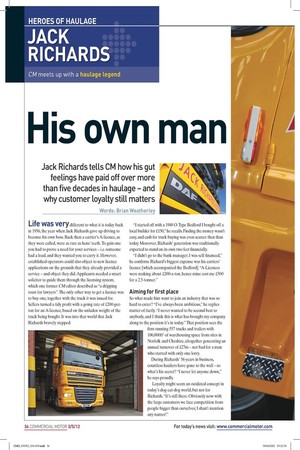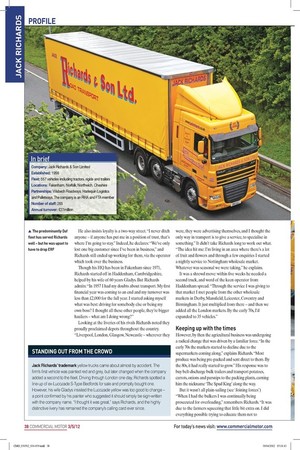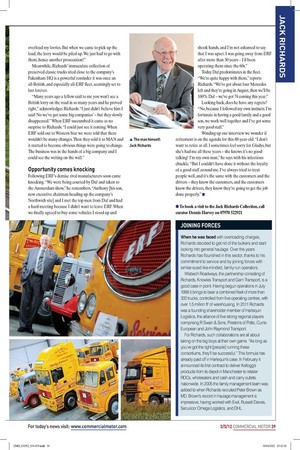His own man
Page 27

Page 29

Page 30

If you've noticed an error in this article please click here to report it so we can fix it.
Jack Richards tells CM how his gut feelings have paid off over more than five decades in haulage – and why customer loyalty still matters
Words: Brian Weatherley
Life was very different to what it is today back in 1956, the year when Jack Richards gave up driving to become his own boss. Back then a carrier’s A-licence, as they were called, were as rare as hens’ teeth. To gain one you had to prove a need for your services – i.e. someone had a load, and they wanted you to carry it. However, established operators could also object to new licence applications on the grounds that they already provided a service – and object they did. Applicants needed a smart solicitor to guide them through the licensing system, which one former CM editor described as “a dripping roast for lawyers” . The only other way to get a licence was to buy one, together with the truck it was issued for. Sellers turned a tidy profit with a going rate of £200-perton for an A-licence, based on the unladen weight of the truck being bought. It was into that world that Jack Richards bravely stepped. “I started off with a 1948 O-Type Bedford I bought off a local builder for £150,” he recalls. Finding the money wasn’t easy, and cash for truck buying was even scarcer then than today. Moreover, Richards’ generation was traditionally expected to stand on its own two feet financially.
“I didn’t go to the bank manager; I was self-financed,” he confirms. Richard’s biggest expense was his carriers’ licence [which accompanied the Bedford]. “A-Licences were making about £200-a-ton, hence mine cost me £500 for a 2.5-tonner.”
Aiming for first place
So what made him want to join an industry that was so hard to enter? “I’ve always been ambitious,” he replies matter-of-factly. “I never wanted to be second best to anybody, and I think this is what has brought my company along to the position it’s in today.” That position sees the firm running 557 trucks and trailers with 106,000ft2 of warehousing space from sites in Norfolk and Cheshire, altogether generating an annual turnover of £27m – not bad for a man who started with only one lorry.
During Richards’ 56 years in business, countless hauliers have gone to the wall – so what’s his secret? “I never let anyone down,” he says proudly.
Loyalty might seem an outdated concept in today’s dog-eat-dog world, but not for Richards. “It’s still there. Obviously now with the large customers we face competition from people bigger than ourselves; I shan’t mention any names!” He also insists loyalty is a two-way street. “I never ditch anyone – if anyone has put me in a position of trust, that’s where I’m going to stay.” Indeed, he declares: “We’ve only lost one big customer since I’ve been in business,” and Richards still ended up working for them, via the operator which took over the business.
Though his HQ has been in Fakenham since 1971, Richards started off in Haddenham, Cambridgeshire, helped by his wife of 60 years Gladys. But Richards admits: “In 1957 I had my doubts about transport. My first financial year was coming to an end and my turnover was less than £2,000 for the full year. I started asking myself what was best: driving for somebody else or being my own boss? I thought all these other people, they’re bigger hauliers – what am I doing wrong?” Looking at the liveries of his rivals Richards noted they proudly proclaimed depots throughout the country. “Liverpool, London, Glasgow, Newcastle – wherever they were, they were advertising themselves, and I thought the only way in transport is to give a service, to specialise in something.” It didn’t take Richards long to work out what. “The idea hit me: I’m living in an area where there’s a lot of fruit and flowers and through a few enquiries I started a nightly service to Nottingham wholesale market. Whatever was seasonal we were taking,” he explains.
It was a shrewd move: within five weeks he needed a second truck, and word of the keen operator from Haddenham spread. “Through the service I was giving to that market I met people from the other wholesale markets in Derby, Mansfield, Leicester, Coventry and Birmingham. It just multiplied from there – and then we added all the London markets. By the early 70s, I’d expanded to 35 vehicles.”
Keeping up with the times
However, by then the agricultural business was undergoing a radical change that was driven by a familiar force. “In the early 70s the markets started to decline due to the supermarkets coming along,” explains Richards. “Most produce was being pre-packed and sent direct to them. By the 80s, it had really started to grow.” His response was to buy belt-discharge bulk trailers and transport potatoes, carrots, onions and parsnips to the packing plants, earning him the nickname ‘The Spud King’ along the way.
But it wasn’t all plain-sailing (see ‘Joining forces’) “When I had the bulkers I was continually being prosecuted for overloading,” remembers Richards. “It was due to the farmers squeezing that little bit extra on. I did everything possible trying to educate them not to overload my lorries. But when we came to pick up the load, the lorry would be piled up. We just had to go with them, hence another prosecution!” Meanwhile, Richards’ immaculate collection of preserved classic trucks sited close to the company’s Fakenham HQ is a powerful reminder it was once an all-British, and especially all-ERF fleet, seemingly set to last forever.
“Many years ago a fellow said to me you won’t see a British lorry on the road in so many years and he proved right,” acknowledges Richards. “I just didn’t believe him I said ‘No we’ve got some big companies’ – but they slowly disappeared.” When ERF succumbed it came as no surprise to Richards. “I could just see it coming. When ERF sold out to Western Star we were told that there wouldn’t be many changes. Then they sold it to MAN and it started to become obvious things were going to change. The business was in the hands of a big company and I could see the writing on the wall.”
Opportunity comes knocking
Following ERF’s demise rival manufacturers soon came knocking. “We were being courted by Daf and taken to the Amsterdam show,” he remembers. “Anthony [his son, now executive chairman heading up the company’s Northwich site] and I met the top men from Daf and had a hard meeting because I didn’t want to leave ERF. When we finally agreed to buy some vehicles I stood up and shook hands, and I’m not ashamed to say that I was upset. I was going away from ERF after more than 30 years – I’d been operating them since the 60s.” Today Daf predominates in the fleet. “We’re quite happy with them,” reports Richards. “We’ve got about four Mercedes left and they’re going in August, then we’ll be 100% Daf – we’ve got 74 coming this year.” Looking back, does he have any regrets? “No, because I followed my own instincts. I’m fortunate in having a good family and a good son, we work well together and I’ve got some very good staff.” Winding up our interview we wonder if retirement is on the agenda for this 88-year-old. “I don’t want to retire at all. I sometimes feel sorry for Gladys, but she’s had me all these years – she knows it’s no good talking! I’m my own man,” he says with his infectious chuckle. “But I couldn’t have done it without the loyalty of a good staff around me. I’ve always tried to treat people well, and it’s the same with the customers and the drivers – they know the customers, and the customers know the drivers, they know they’re going to get the job done properly.” ■
● To book a visit to the Jack Richards Collection, call curator Dennis Harvey on 07970 522921










































